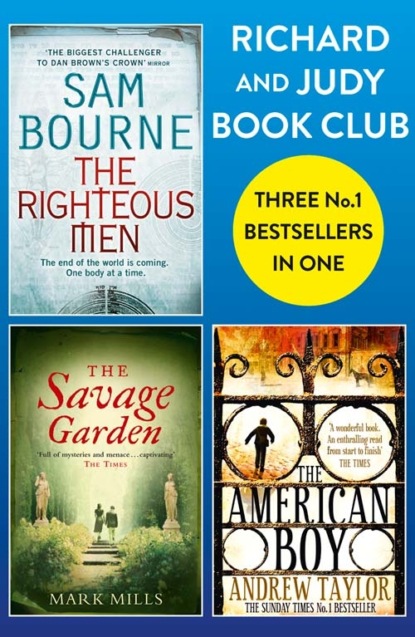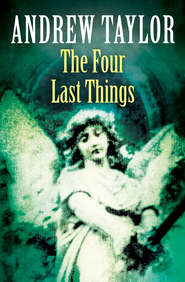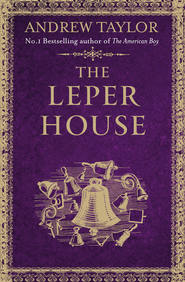По всем вопросам обращайтесь на: info@litportal.ru
(©) 2003-2024.
✖
Richard and Judy Bookclub - 3 Bestsellers in 1: The American Boy, The Savage Garden, The Righteous Men
Автор
Год написания книги
2018
Настройки чтения
Размер шрифта
Высота строк
Поля
“Assuming he speaks the truth, what does he want from his son? Money?”
“Quite possibly. Yet he may not have acted entirely from self-interest.”
Frant gave his bark of laughter. “You surely do not suggest that he has suddenly been overwhelmed by the weight of his paternal responsibilities?”
“No – yet a man may sometimes act from more than one motive. Perhaps he is curious. There may even be a streak of tender sentiment in him. He told me he merely wanted to see the boy, to hear him speak.”
Frant nodded. “Once again, Mr Shield, I am obliged to you. Where does he lodge? Did you find that out?”
“He declined to give me his precise direction. He lives in St Giles. As you know, it is a perfect maze of alleys and courts and he doubted I could find his lodging even if he told me where it was. But he informed me he is often to be found in a nearby tavern, the Fountain. He plies his trade there.”
“He is gainfully employed?”
“As a screever.”
Frant shrugged. “And takes his fees in gin, no doubt.”
He fell silent and took a turn about the room. In a moment, he said, “So you have done me a second service, Mr Shield. May I ask you to do a third?”
I bowed.
“I would be obliged if you would preserve the utmost discretion about this. Considered in all its aspects, this is a delicate matter. Not so much for you or me but for others. I see a good deal of Mr Allan in the way of business, and I know he is fond of the boy, and treats him as his son. The arrival of someone claiming to be the lad’s natural father would come as a profound shock. Indeed, I understand Mrs Allan is in delicate health and such a shock could kill her.”
“You think Mr Poe may be an impostor?”
“It is possible. Some reprobate American, perhaps, who knows of Mr Allan’s wealth, and his generosity towards the boy and his affection for him. Then we must consider Mr Bransby, must we not? Should this matter become public, and should it also become known that an Irish rogue from St Giles preyed on boys while they were in the care of Mr Bransby, then I do not imagine the effect upon the school would be a healthy one. A school is like a bank, Mr Shield, in that there must be mutual trust between the institution and its customers, in this case between the school and the parents who pay the bills. A rumour of this affair, should it get out, would spread widely, and no doubt become exaggerated in the telling.”
“Then what is to be done, sir?” I was alive to the fact, as no doubt Mr Frant intended I should be, that my welfare was to some extent tied to the school’s, and that if Mr Bransby’s profits diminished, then so might the size of his establishment.
“I am also mindful that young Edgar Allan has been a friend to my boy,” Frant went on, as though thinking aloud, as though I had not spoken. “So, taken all in all, I think we should encourage the soidisant Mr Poe to – ah – neglect his duties as a father. I shall make it worth his while, of course.” He gave me a sudden, charming smile. “Mr Bransby is indeed fortunate in his assistants. Should you ever tire of the teaching profession, Mr Shield, let me know. There are always openings to be found for young men of parts and discretion.”
Twenty minutes later, the boys and I rattled away from that big, luxurious house in Russell-square. The boys chatted happily about what they had done and what they had eaten. I sat back in my corner, enjoying the feel of the leather and the faint smell of Mrs Frant’s perfume. I confess that during the day my opinion of Henry Frant had changed considerably. Previously I had thought him a proud and disagreeable man. Now I knew there was a more amiable side to him. I toyed with a pleasant dream in which Mr Frant used his influence to obtain for me a well-paid sinecure in Whitehall or brought me into Wavenhoe’s Bank to work as his secretary. Stranger things had happened, I told myself, and why should they not happen to me?
Chapter 16 (#ulink_c6859b44-0626-5a3f-bb28-889e34c47e24)
Such was my naïveté, I believed that my aunt’s attorney Mr Rowsell had conceived a sudden liking for me. The apparent proof of this came in the form of an invitation to dinner.
He wrote that there was another document to be signed in connection with my aunt’s estate. Moreover, he had devoted some thought to the question of how I might lay out my modest nest-egg to best advantage. He believed he was now in a position to offer me some advice, should I wish to receive it. Unless I preferred to call on him in Lincoln’s Inn, Mrs Rowsell would be pleased if I would dine with them on any Saturday I cared to name. He understood, of course, that my time was not at present my own, but no doubt my employer would understand how desirable it was that the disposition of my aunt’s estate should be completed as soon as possible.
The Rowsells lived at Northington-street in the neighbourhood of Theobalds-road. On Saturdays, Mr Rowsell went to Lincoln’s Inn during the morning and they dined at five. When I arrived, Mrs Rowsell made a brief appearance, her face flushed, wiping floury hands upon her apron. She was a plump lady, considerably younger than Mr Rowsell. Having greeted me, she made her excuses and returned to the kitchen.
Mr Rowsell seemed to have forgotten the original purpose of my visit. He called for the children, who had been with their mother. There were four of them, ranging in age from three to nine. Puffing with exertion, he led us up to the sitting room on the first floor where I did my best to amuse the elder boy and girl with card tricks and the like.
The dinner was served in a parlour at the front of the house. Mrs Rowsell was plainly anxious, but as the dishes succeeded each other without accident she became more cheerful. After we had attacked an enormous suet pudding and retired defeated, the cloth was withdrawn and Mrs Rowsell left us to our wine. As she passed round the table to the door, her husband leant backwards in his chair and, believing himself unobserved by me, pinched her thigh. She squealed – “Oh la! Mr Rowsell!” – smacked his hand away and scuttled out of the room.
Mr Rowsell beamed at me. “Man was born for the married state, Mr Shield. The benefits it brings are inestimable. A toast, sir! A toast! Let us drink to Hymen.”
It was the first of many toasts. By the time we had finished the second bottle of port Mr Rowsell was lying back in his chair, glass in hand, his clothes loosened, trying to recall the words of a sentimental ballad of his youth. He exuded benevolence. Yet his little blue eyes often stared at me in a fixed manner I found uncomfortable, and it occurred to me that perhaps he was less drunk than he appeared. I dismissed the idea almost at once because there was surely no reason for him to deceive me.
With the third bottle, he put music aside and talked with unexpected eloquence about money, a subject that interested him in the abstract: in particular he was fascinated by its ability to grow and diminish apparently of its own volition, without relation to the goods or services it theoretically stood for. This at last gave me an opportunity to bring the conversation round to the reason for my invi tation to dinner.
“You wrote, sir, that you were in a position to advise me about how to lay out my aunt’s money?”
“Eh? Oh yes.” He leant back in his chair and looked at me with great solemnity. “In your position I should avoid risk. I recall that at an earlier stage of our acquaintance, you mentioned that your esteemed employer had recommended Wavenhoe’s Bank to you.”
“Yes, sir.”
“There is a personal connection of some sort, I collect?”
“We have a boy at the school whose father, Mr Henry Frant, is one of the partners.”
Mr Rowsell wiped his pink, moist forehead with a gravy-spattered napkin. “Mr Frant is the youngest of the partners, I believe, but nowadays takes the leading part in the business.”
“I understand that Mr Wavenhoe himself is not well.”
“I remember your mentioning the circumstance. It is common knowledge that he is dying. They say in the City that it will be only a matter of weeks.”
I thought of Sophia Frant. “I’m sorry to hear it, sir.”
“Things were very different when Wavenhoe was young. It was his father who founded the bank. City people, of course, tended to steer clear of those West End accounts. The further West you go, I always say, the higher the profits but the higher the risk. Of course he was lucky to get Carswall. In a private partnership you can do nothing without capital.” He looked sternly at me. “Stephen Carswall may not be an agreeable man, but no one would deny he has capital. Shrewd, too. Sold his sugar plantations in the nineties, early enough to get a good price. Mind you, many men thought he was mad. But he could see the way the wind was blowing. Those damned Abolitionists, eh? Once you abolish the trade, it’s only a matter of time before the institution itself is under threat. When the institution goes, as it will, the entire economic foundation of the West Indies will be destroyed. But Carswall was ahead of the game there. That’s the beauty of banking: all you need is capital; none of the worry of land and other fixed property. They can’t abolish money, thank God. Though I wouldn’t put it past them to try.” He pushed the port towards me. “Where was I?”
“You were describing how Mr Carswall became Mr Wavenhoe’s partner, sir. Did he take an active part in the running of the bank?”
“He left that to Wavenhoe most of the time, as far as the City was concerned, at least. But what went on behind the scenes may have been another matter. Carswall has many friends in America, especially in the southern states, and they did a good deal of business over there. And they did very well in Canada, despite the late war.” Mr Rowsell was of course referring to that inconclusive and largely unnecessary squabble between Great Britain and the United States, not to the great war with France.
I said, “So they had a finger in every man’s pie?”
“Spread the risks, eh, increase the profits. It was Carswall who brought in young Frant. Not that he’s so young any more. You have met him?”
“Yes, sir. I was able to do him a small service, and he was most amiable. He is very much the gentleman, of course.”
“The family fell on evil times, which forced him into trade. As for his amiability, I hear a different story. Frant has ability, I don’t question that. It’s just that – your glass, sir, your glass is empty.”
Breathing heavily, Mr Rowsell refilled the glass so well that it overflowed. The diversion caused him to lose the thread of his discourse. He sipped his wine and stared with a frown at the polished mahogany.
“Is Mr Carswall married?” I asked after a moment or two.
“Married? Not now. There was a wife, I believe, but she died. Mind you –” He lowered his voice and leant towards me. “I’m not saying he hasn’t found consolation. Stephen Carswall used to have something of a reputation, if you get my drift.” He tapped his nose to make his drift even clearer. “He’s kin to George Wavenhoe. You knew they were cousins?”
I shook my head.
“Stephen Carswall’s mother was sister to George’s father. So they are first cousins.” He laughed and stabbed his forehead once more with the napkin. “Young Frant was a fly one. He came in as Carswall’s man, and what does he do but marry Sophia Marpool, old Wavenhoe’s niece? So there he is, with a connection to both partners. A love match, they say, but I wager that most of the love was on one side. Master Henry thinks he’s the heir apparent, the crown prince. But it’s ill luck to count your gains during the game, eh?”
Rowsell stood up, staggered to the door, opened it with difficulty, and bellowed for the servant to bring another bottle.
“Something went wrong? Something to do with Mr Carswall?”
“There was a host of reasons. First Carswall decided to withdraw his capital. He’d settled in the country, turned gentleman, wanted nothing to do with the bank. The story is that Wavenhoe was pressed to find the ready cash when it was needed. It was a large sum. Then Wavenhoe himself has not been well these last few years. He left more and more of the day-to-day conduct of business in the hands of Henry Frant. The City does not feel entirely easy with Frant. It is not just that he is a gentleman dabbling in trade. There are stories that he is fond of play, like his father before him. That was how the Frants lost their money.”











